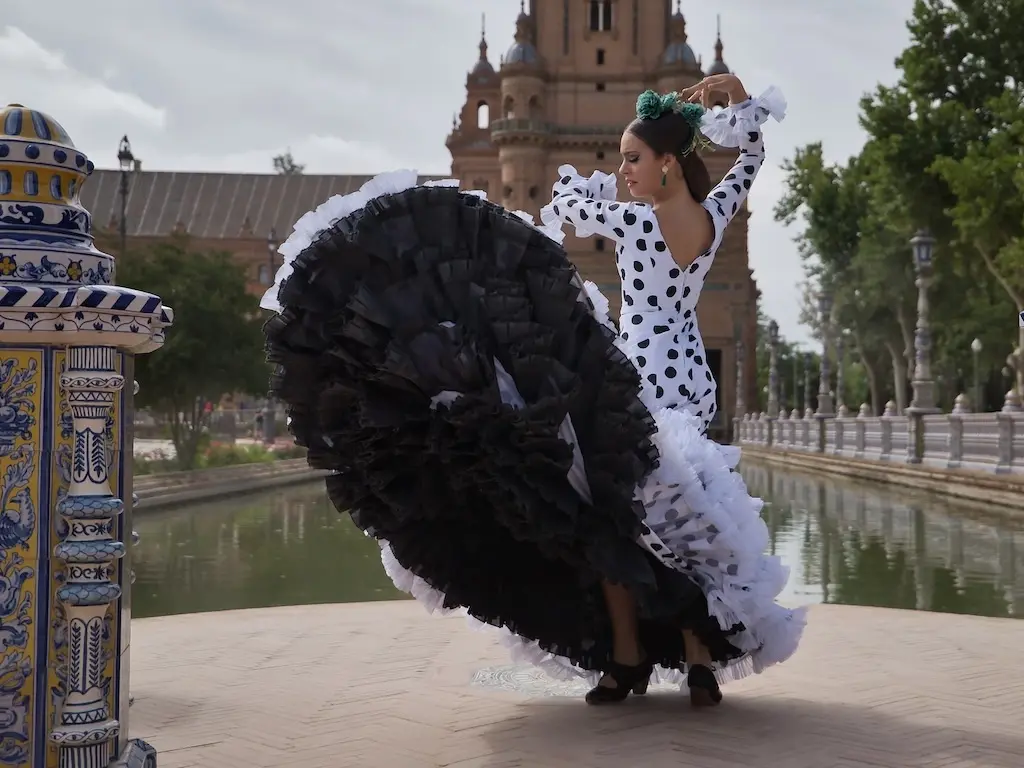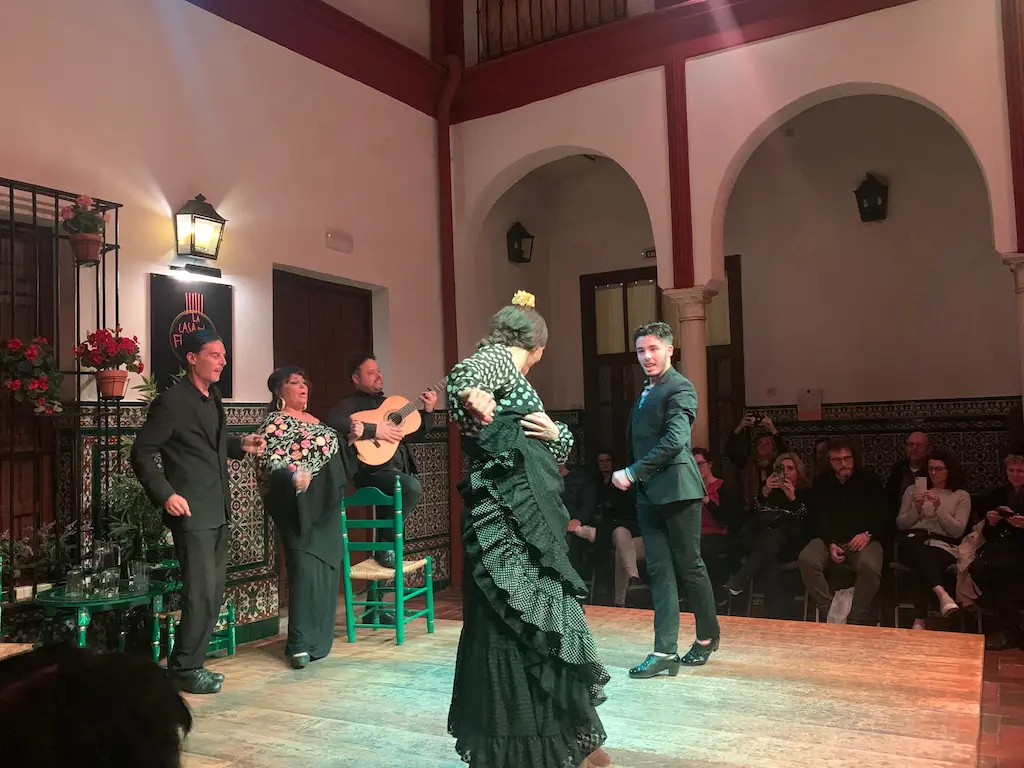If you want to get a taste of Andalucian culture, nothing's better than experiencing flamenco in Seville. Here's a guide on how to watch flamenco in Seville.
By Liza S. | Updated 8 Apr 2024 | Seville | Places To Go |
Login to add to YOUR Favourites or Read Later


Have you ever felt the soul-stirring power of flamenco? Seville, the heartland of this passionate art form, offers an immersive dive into its fiery rhythms and emotive performances. Flamenco in Seville is not just a dance or musical genre; it's an expression of deep cultural heritage, where every stomp, guitar strum, and heartfelt lyric tells a story of love, pain, and joy.
This article will guide you through the vibrant flamenco scene in Seville, from the intimate tablaos that echo with the raw energy of live performances to the bustling festivals that bring the city to life.
Whether you're a flamenco aficionado or a curious traveller looking to experience the authentic spirit of Andalucia, Seville's flamenco scene offers a profound journey into the soul of Spain. Join us as we explore what makes flamenco in Seville an unforgettable experience and how you can can watch flamenco in Seville (...yes, even for free!).
Flamenco lies at the heart of Andalucian culture. It’s an expressive and deeply emotional art form that combines song, dance, and guitar. It's more than just a performance; it's a story of human experience, echoing the soul of southern Spain.
Flamenco's origins are as diverse as the cultures that have influenced Andalucia over centuries, including Gypsy, Moorish, Jewish, and Andalucian heritages, blending into a unique and intense art form that speaks to the spirit of resilience, passion, and joy.
Flamenco comprises three main components: Cante (song), Baile (dance), and Toque (guitar playing), each essential to the performance's overall emotion and impact.
Cante is the heart of flamenco, with lyrics reflecting the sorrows and joys of everyday life. Baile is where the dancer's body becomes an instrument, conveying powerful emotions through intricate footwork and graceful movements. Toque, the guitar playing, weaves these elements together, providing a melody that echoes the depth and complexity of flamenco's storytelling tradition.
The magic of flamenco is that each show is a unique expression of the artist's emotions and the cultural history that shapes this art form. That’s because flamenco is improvised on the spot, without prior rehearsing, which lends it this fresh, raw quality of artistry that is just mesmerising to watch.
In recognition of its cultural significance and the tradition it carries, UNESCO declared flamenco an Intangible Cultural Heritage of Humanity in 2010. This acknowledgment not only celebrates flamenco's artistic value but also its role in fostering social cohesion and cultural identity within and beyond Spain.
Seville isn't just another city in Spain where flamenco is performed; it's considered the birthplace and the soul of flamenco, offering a depth of experience that can't be found elsewhere.
The flamenco shows here are known for their authenticity. Unlike the more commercialised versions aimed at tourists in other cities, Seville offers a glimpse into the real soul of flamenco, where the emotion and raw energy of the performance are palpable.
As you prepare to experience flamenco in Seville, remember that you're not just witnessing a performance; you're partaking in a centuries-old tradition that continues to evolve and enchant audiences around the world.
Click here for more on the history of flamenco.
As it’s such a vital part of Sevillian culture, there are many opportunities to experience flamenco for free in Seville.
This is great if you’re on a budget, if you’re curious about flamenco but not sure if it’s your thing, or if you want a more down-to-earth and spontaneous experience of this Andalucian artform.
Here’s how you can immerse yourself in the world of flamenco in Seville, absolutely free.
The winding alleys and vibrant squares of Seville often play host to impromptu flamenco performances, especially in the warmer months.
Locations such as Plaza de España, the Alameda de Hércules, and the bustling streets of the Triana district are popular spots for buskers and flamenco artists to share their craft. These performances, though not as structured as those in tablaos, capture the spontaneity and raw emotion of Flamenco.
Wander through Seville’s historic districts and keep your ears open for the sound of Flamenco music. Sometimes, the best performances are those you stumble upon unexpectedly. And it’s always a nice gesture to leave a tip if you enjoy a street performance.
Keep an eye out for local festivals and cultural celebrations as well. Flamenco is a staple of many Sevillian fiestas, offering performances that are as rich in spirit as those found in any formal venue. The city’s iconic Feria de Abril is a prime time to see some spontaneous flamenco.
Tip: You can almost always find flamenco buskers at Plaza de España, in the centre of the semi-circular building. Just listen out for the sound of music, stomping feet and rhythmic claps.
Some local bars and peñas (flamenco clubs) in Seville host free flamenco nights, where both up-and-coming and seasoned performers take the stage. While the performances are free, it’s customary to order a drink or a small plate as a way to support the establishment.
Peñas Flamencas, often run by Flamenco enthusiasts and aficionados, offer a more traditional and community-oriented experience. These venues are about sharing and celebrating Flamenco within the community, making them ideal for experiencing the art in its most authentic form.
Check out these venues:
Occasionally, cultural institutions and schools in Seville offer free flamenco shows, demonstrations, or workshops as part of their educational outreach. These events are a fantastic way to not only see flamenco performed by passionate students and professionals but also to gain insights into the dance's history, styles, and techniques.
Keep an eye on local event calendars and cultural centre announcements for these opportunities.
Experiencing flamenco in Seville doesn’t have to come with a price tag. Through its street performers, local bars, and cultural events, the city offers countless opportunities to witness the beauty and passion of flamenco.
These free experiences not only showcase the talent and diversity of Flamenco artists but also reflect the art form’s deep-rooted significance in Sevillian culture.


Flamenco show in Casa del Flamenco in Seville
While it’s great to be able to watch flamenco for free, in my opinion, it’s still well worth it to watch a professional flamenco show in Seville.
As you might expect, there are numerous venues offering shows and it can be overwhelming to figure out which one to go to. That’s why I’ve put together a list of my top 5 recommended flamenco shows in Seville (3 of which I’ve personally seen and loved).
The good news is that watching a flamenco show is affordable (especially if you opt for a show-only experience instead of a dinner-and-show one). Most shows cost under €30 for a 1 hour performance.
Immersing yourself in the passionate world of flamenco in Seville is an experience like no other. To ensure you make the most of your flamenco adventure, here are some tips to keep in mind when watching a flamenco show in Seville:
Be sure to see my list of best flamenco shows in Seville for my personal recommendations!
I hope this article has provided you with helpful information on how to experience the beautiful passion of flamenco in Seville. It’s definitely worth seeking out flamenco in Seville to get a taste of Andalucia’s rich cultural soul.
From the intimate tablaos that echo with the soulful cries of passionate artists to the vibrant street performances that capture the spontaneous joy of flamenco, Seville offers flamenco experiences for every visitor.
Seville is ready to unveil the beauty of its flamenco spirit to you — Olé!
Need help planning exactly what to see and do on your Seville visit? Our itineraries can help guide you:
You can also read our other articles on Seville: